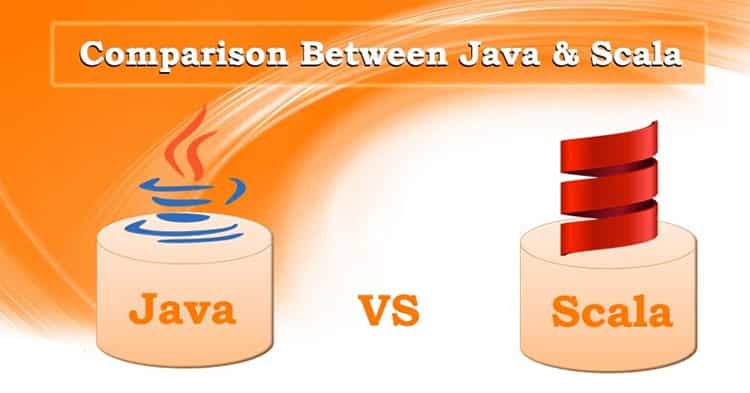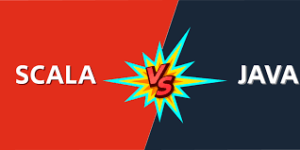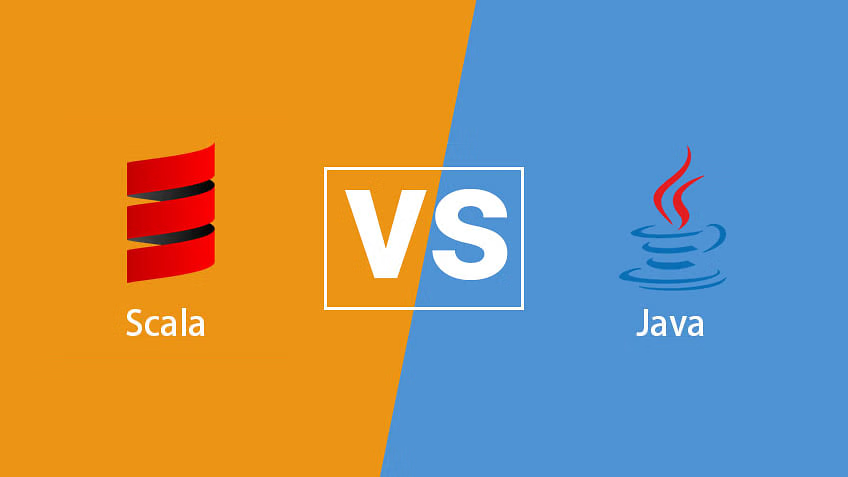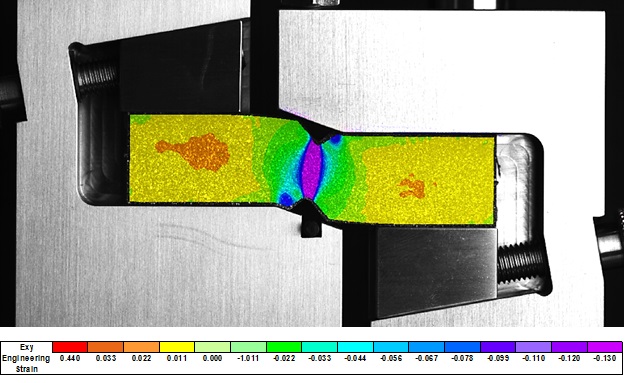What is Scala vs Java Performance: Choosing Right Language

In the context of Scala vs Java, Scala stands for Scalable Language. It is a multi-paradigm, statically typed programming language. Scala combines features of functional programming and object-oriented programming. Its source code is compiled into bytecode and executed by the Java Virtual Machine (JVM).
When compared to Java, Scala is a relatively newer language that is machine-compiled. While Java is an object-oriented language, Scala offers a multi-core work architecture, improved code readability, and conciseness. Scala also tends to reduce the number of lines of code required compared to Java.
In this Scala vs Java post, we will compare Scala and Java across various aspects to help you choose the right language for your specific needs.
What is Scala vs Java
Scala is a general-purpose programming language that was designed to combine the best features of object-oriented programming (OOP) and functional programming (FP). It was created by Martin Odersky and first released in 2004. The name “Scala” is short for “scalable language,” reflecting the language’s ability to scale from small scripts to large-scale applications.
Scala uses in a variety of domains, including data processing, concurrent and distributed systems, web development, finance, and machine learning. Its scalability, functional programming capabilities, and interoperability with Java make it a popular choice for building robust and high-performance applications.

Key features of Scala include:
- Object-Oriented and Functional Programming:
Scala supports both object-oriented and functional programming paradigms. It allows you to write code using classes, inheritance, and polymorphism, similar to languages like Java, while also providing powerful functional programming constructs such as higher-order functions, immutable data structures, and pattern matching.
- Static Typing and Type Inference:
Scala has a static type system, which means that types are checked at compile-time, enabling early detection of errors. It also employs type inference, which allows the compiler to deduce the types of expressions and variables automatically, reducing the need for explicit type annotations.
- Concise and Expressive Syntax:
Scala’s syntax is designed to be concise and expressive. It provides advanced features like higher-order functions, closures, and implicit conversions, which enable developers to write expressive and readable code. Scala also supports operator overloading and allows the definition of custom operators.
- Interoperability:
Scala is fully compatible with Java, making it easy to integrate Scala code with existing Java codebases. Scala programs can use any Java library and can be called from Java code. This compatibility with Java has contributed to the adoption of Scala in certain industries and projects.
- Scalability and Concurrency:
Scala is known for its ability to handle scalability and concurrent programming. It provides powerful abstractions and libraries for concurrent and parallel programming, including the Akka framework, which is widely used for building highly scalable and fault-tolerant applications.
- Rich Ecosystem:
Scala has a vibrant ecosystem with a wide range of libraries and frameworks that cover various domains, such as web development, data processing, and distributed computing. Notable frameworks include Play Framework, Apache Spark, and Akka.
What is Scala used for?
In the context of Scala vs Jave, Scala is designed to accommodate the needs of its users, supporting everything from small scripts to large-scale data processing systems. It is widely used in data processing, distributed computing, and web development. Many companies rely on Scala for their data engineering infrastructure. It is primarily used by software engineers and data engineers, with some data scientists leveraging it alongside Apache Spark for processing massive datasets.
On the other hand, Java is a widely used programming language known for its versatility. It is used for developing a variety of applications, including web and enterprise applications, mobile apps, desktop software, and embedded systems. Java’s platform independence, robustness, and extensive libraries make it popular among developers for building reliable and scalable software solutions.
Scala vs Java: How to Choose the Right Language for Your Projects
When it comes to choosing a programming language for your projects, Scala and Java are two popular options. While both languages have their strengths and areas of application, understanding their key differences can help you make an informed decision.
- Object-Oriented vs Object-Functional:
Java is a mature and widely used object-oriented language, while Scala blends object-oriented and functional programming paradigms. Scala’s functional programming features allow for concise and expressive code, making it suitable for complex and data-intensive applications. - Interoperability:
Both Scala and Java run on the JVM, enabling seamless interoperability between the two languages. This means you can leverage existing Java libraries and frameworks within Scala projects, making migration or integration easier. - Concurrency and Parallelism:
Scala provides built-in support for concurrent and parallel programming with its actor model and lightweight threads. Java, on the other hand, relies on traditional thread-based concurrency. Scala’s concurrency features make it suitable for building high-performance, scalable systems. - Code Readability and Conciseness:
While Java is known for its readability, Scala’s expressive syntax and functional constructs can often result in more concise code. Scala’s type inference and operator overloading contribute to reducing boilerplate code compared to Java. - Community and Ecosystem:
Java has a vast and mature ecosystem with extensive libraries, frameworks, and tools. Scala, although not as widespread, has a growing community and a range of libraries and frameworks tailored to specific use cases like data processing, web development, and machine learning.
Scala vs Spark
Scala and Apache Spark are related but distinct technologies:
- Scala: Scala is a programming language that can be used for a wide range of applications beyond big data processing. It provides features like functional programming, object-oriented programming, and strong static typing.
- Apache Spark: Spark is a distributed computing framework that is often used with Scala. It provides high-level APIs for distributed data processing and analytics, and Scala is one of the primary languages supported for writing Spark applications.
Scala vs Python for spark
Scala is the native language of Apache Spark and is typically considered the primary language for Spark development. Scala provides better performance and a more seamless integration with Spark’s APIs. However, Python is also widely used with Spark, thanks to its ease of use, extensive libraries, and popularity among data scientists.
Scala vs Python
Scala and Python are both popular programming languages, but they have different strengths:
- Scala: Scala is known for its static typing, strong type inference, and scalability. It excels in building large-scale applications and is commonly used in data processing and concurrent systems.
- Python: Python prioritizes simplicity and readability. It is widely used in various domains, including web development, data analysis, and machine learning, thanks to its extensive libraries and ease of use.
Scala vs Python performance
In general, Scala tends to have better performance than Python due to its static typing and the fact that it compiles to bytecode that runs on the Java Virtual Machine (JVM). However, Python’s extensive libraries and ecosystem make it a popular choice for rapid prototyping and data analysis tasks despite its lower performance.
Scala vs Rust
- Scala: Scala is a general-purpose language known for its scalability, conciseness, and strong integration with the Java ecosystem. It is often used for building large-scale applications and is popular in the data processing and concurrent systems domains.
- Rust: Rust is a systems programming language that prioritizes memory safety, performance, and concurrency. It offers low-level control without sacrificing safety and is commonly used for developing high-performance, secure, and reliable software, particularly in areas like embedded systems, operating systems, and network programming.
Scala vs Kotlin
Scala and Kotlin are both modern programming languages, but they have different origins and focuses:
- Scala: Scala is a general-purpose language that combines object-oriented and functional programming. It is known for its scalability, conciseness, and strong integration with the Java ecosystem.
- Kotlin: Kotlin is a statically typed language developed by JetBrains. It is designed to be concise, expressive, and interoperable with existing Java code. Kotlin is popular for Android app development and is known for its safety features and developer productivity enhancements.
Scala vs Java: Which is More Complex?
one of the criticisms of Java is its verbosity, which can lead to more complex and lengthy code compared to Scala. While Scala may have a slightly more complex structure, it offers powerful features that allow developers to write more concise and expressive code. The Scala compiler’s intelligence enables automatic inference, reducing the need for explicit specifications. For instance, a simple “Hello World!” program in Scala tends to require fewer lines of code compared to Java, showcasing Scala’s conciseness.
Key Difference between Scala vs Java
Scala is a statically typed programming language with features like type inference, while Java is a cross-platform, network-centric language. Scala utilizes the actor model for modern concurrency, while Java adopts a thread-based model. Additionally, Scala variables are immutable by default, whereas Java variables are mutable by default.
Scala vs Java, here are the points
- Scala supports lazy evaluation, while Java doesn’t support lazy evaluation.
- Scala doesn’t contain static members, whereas Java contains static members.
- Scala supports operator overloading, whereas Java doesn’t support operator overloading.
- Scala doesn’t offer backward compatibility, whereas Java offers backward compatibility.
- Scala can be less readable due to nested code, while Java is often considered more readable.
- Scala frameworks include Play and Lift, while Java frameworks include Spring, Grails, and many more.
Features: Scala vs Java
Java
- Write code once and run it on almost any computer platform.
- Designed for building object-oriented applications.
- Very robust and highly secure.
- Multithreaded language with automatic memory management.
- Facilitates distributed computing as it is network-centric.
Scala
- Object-oriented but also a functional language.
- Concise and powerful, capable of growing according to user demand.
- Allows execution of Java code.
- Statically typed.
Advantages: Scala vs Java
Java
- Detailed documentation is available.
- A large pool of skilled developers is available.
- Allows you to form standard programs and reusable code.
- It is a multi-threaded environment that enables concurrent task execution.
- Excellent performance.
- Huge array of 3rd party libraries.
- Easy to navigate libraries.
Scala
- Scala is easy to learn for object-oriented programmers, such as Java developers, and has gained popularity in recent years.
- Scala offers first-class functions for users.
- Scala can be executed on the JVM, enabling interoperability with other languages.
- It is designed for concurrent, distributed, resilient, and message-driven applications, making it highly in demand.
- Scala is concise and powerful, capable of scaling quickly to meet user demands.
- It combines object-oriented and functional programming features, providing flexibility to developers.
- Scala offers many Duck Types.
- It has less boilerplate compared to Java.
- The Scala-based frameworks Lift and Play are experiencing growth.
Disadvantages: Scala vs Java
Java
- JIT compiler can make the program comparatively slow.
- Java has high memory and processing requirements, leading to increased hardware costs.
- No support for low-level programming constructs like pointers.
- Lack of control over garbage collection as Java does not provide functions like delete() or free().
Scala
- Scala has a limited community presence.
- It is not easily adaptable or widely adopted.
- Backward compatibility is limited in Scala.
FAQs:

Scala vs Java
Why Scala over Java
The answer why use Scala over Java is Scala offers several advantages over Java:
- Conciseness: Scala’s concise syntax allows for shorter and more expressive code.
- Functional Programming: Scala’s support for functional programming enables cleaner and more modular code.
- Scalability: Scala’s scalability makes it suitable for building large-scale applications.
- Interoperability: Scala seamlessly integrates with existing Java code and libraries.
Where is Scala used?
Scala is used in various domains, including:
- Data processing: Scala, along with Apache Spark, is popular for big data processing and analytics.
- Web development: Scala frameworks like Play and Lift are used for building scalable and high-performance web applications.
- Concurrent and distributed systems: Scala’s actor model and Akka framework are utilized for building highly concurrent and distributed systems.
- Financial and banking software: Scala is employed in the finance industry due to its strong type system and scalability.
- Machine learning and data science: Scala, together with libraries like Breeze and Deeplearning4j, is used in machine learning and data science applications.
What is Scala programming?
Scala is a programming language that combines elements of object-oriented programming and functional programming. It is designed to be scalable and expressive, with a concise syntax. Scala code is compiled into bytecode and executed on the Java Virtual Machine (JVM).
What is Scala good for?
Scala is well-suited for a variety of use cases:
- Big data processing and analytics with frameworks like Apache Spark.
- Building scalable and high-performance web applications using frameworks like Play and Lift.
- Concurrent and distributed systems development with the Akka framework.
- Building robust and maintainable software with its expressive and concise syntax.
- Machine learning and data science applications.
Scala technology or Scala software explained
Scala is a programming language that runs on the Java Virtual Machine (JVM) and combines object-oriented and functional programming concepts. It is designed to be scalable, expressive, and interoperable with Java, making it suitable for a wide range of applications.
Scala is used to develop a wide range of software applications, including web applications, distributed systems, data processing and analytics, concurrent and parallel programming, machine learning, and more. It provides a powerful language and ecosystem for building robust and scalable software solutions.
Is Scala a recommended language to learn after Java, or would it be better to learn a different language such as Python or Ruby first?

Scala vs Java:
Whether to learn Scala after Java or another language like Python or Ruby depends on your specific goals and interests. Here are a few considerations to help you make a decision:
- Similarity to Java: If you are already familiar with Java, learning Scala can be a natural progression. Scala runs on the JVM and has strong interoperability with Java, allowing you to leverage your existing Java knowledge and codebase.
- Object-Oriented vs Functional Programming: Scala combines object-oriented and functional programming paradigms, which can expand your understanding of programming concepts. If you are interested in exploring functional programming or building scalable, concurrent systems, Scala can be a good choice.
- Industry Demand and Job Opportunities: Consider the demand for Scala skills in the job market. While Scala is not as widely adopted as languages like Java or Python, it is gaining popularity in certain domains such as big data processing and distributed systems. Research the job market to assess the demand for Scala in your target industry.
- Project Requirements: If you have specific project requirements or interests that align with languages like Python or Ruby, such as web development or data analysis, it might be more beneficial to learn those languages first.
- Personal Interest and Learning Curve: Ultimately, consider your interest and motivation. Learning a new language requires time and effort, so choose a language that aligns with your interests and goals.
What makes Scala more difficult to learn than other programming languages such as Ruby and Python?
Scala vs Java: Due to its unique features and conceptsScala is often considered more difficult to learn than languages like Ruby and Python . Here are a few reasons:
- Object-Oriented and Functional Paradigms: Scala combines object-oriented programming and functional programming paradigms, which can be unfamiliar to programmers who are primarily used to one style. It introduces concepts like higher-order functions, immutable data structures, type inference, and pattern matching. Understanding and effectively using these concepts can take time and effort.
- Static Typing and Type System: Scala has a strong static type system that can be more complex compared to dynamically typed languages like Ruby and Python. The type system in Scala allows for advanced features like type inference and type-safe metaprogramming, but it also requires a deeper understanding and careful handling of types.
- Complex Syntax: Scala’s syntax is more complex compared to languages like Ruby and Python. It has a rich set of features and allows for expressive code, but this can also lead to more intricate syntax rules. Scala’s syntax can be overwhelming for beginners, especially when compared to the more straightforward and concise syntax of Ruby and Python.
- Advanced Concepts and Libraries: Scala has a steep learning curve when it comes to advanced concepts and libraries. It provides powerful abstractions and features like implicit conversions, type classes, and macros, which can be challenging to grasp for newcomers. Additionally, Scala’s ecosystem has many powerful libraries and frameworks, such as Akka and Spark, which require additional learning and understanding.
- Community and Resources: Scala has a smaller community and fewer learning resources compared to widely used languages like Ruby and Python. Finding comprehensive and up-to-date learning materials, tutorials, and community support for Scala might be more challenging.
What is scala vs java performance: Choosing Right Language
See Also:
- How to find a np transpose matrix in Python
- Numpy Transpose Matrix in Python:
- Python Classes and Objects Exercises for Beginners
- Functional Programming vs OOP: Best Comparison
- Python Inheritance Constructor | Super | Override | Init
- Using Python Lamda if else | elif | function | syntex
- How to Convert Python JSON to CSV using Python Libraries
- What does Numpy Arange do | np.arange
- How Many Data Types in Python with examples
- What is scala vs java performance: Choosing the Right Language





